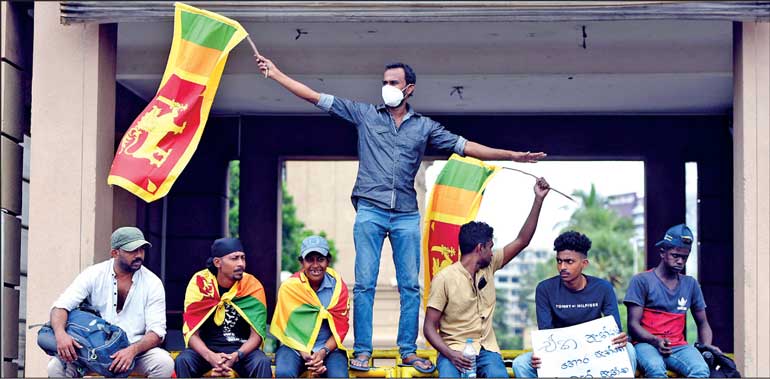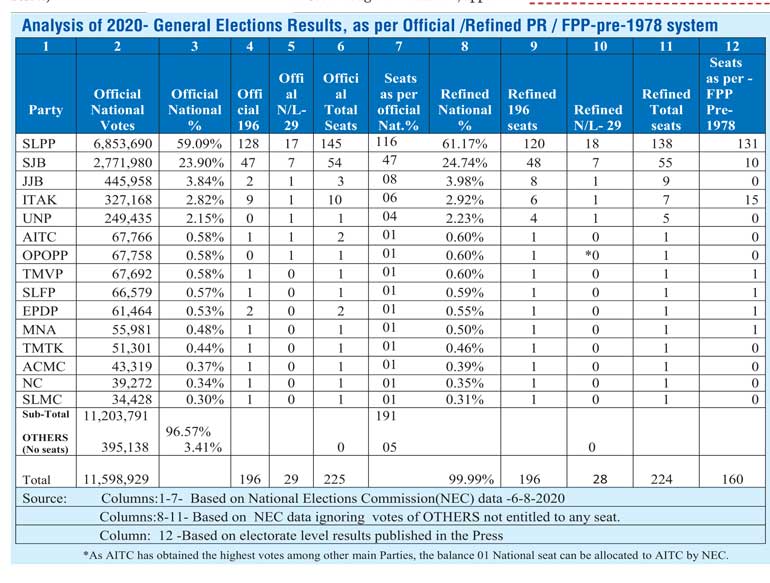Friday Feb 20, 2026
Friday Feb 20, 2026
Saturday, 4 June 2022 00:30 - - {{hitsCtrl.values.hits}}

 1.0 Preamble
1.0 Preamble
At the outset I thank the young, intelligent and peaceful protestors mainly at the Galle Face, ‘Aragala Bhoomiya’ for opening the doors for ‘system changes’ in our electoral system/process that has failed to meet voter expectations for the last 74 years, using “Curse of the ‘225’” as the key.
As a sovereign voter/main stakeholder in our electoral system/process, I have identified the following shortcomings in the existing system and proposed remedies through the press several times over the last decade without any constructive response from the concerned authorities or voter dedicated civil organisations.
Failure to guarantee:
a)The UN declared democratic ‘Equality of Vote’.
b)The ‘Quality of Peoples’ Representatives’.
c)National unity forging ‘Sri Lankan ness’ and reconciliation.
d) A specified % of seats to women/youth candidates.
e) Implementation of ‘National list’ scheme to meet its real objectives.
f) Prevention of ‘cross-over’ mockery coupled with corruption and ‘deal politics’.
g) Non-registration of spurious political parties adding wasteful and confusing length to Ballot papers.
h) Acceptance of ‘Party Election Manifestoes’ as the principal document for voter decision.
i) Simplicity of the Electoral system for easy understanding by our simple voters.
j) Cost-effectiveness and productivity of the system.
k) A level playing field for contesting parties through ‘Campaign Finance’ limits
l)Abolition of dictatorial Executive Presidency.
m)An efficient Provincial Council system sans interference from National level MPs.
n)Fair and incorrupt assistance at local level due to high politicisation of Local Govt. Machinery.
Accordingly, I am pleased to share with you all as given below, a summary of some ‘system changes’ (not exhaustive) based on Democracy, Meritocracy and Accuracy, guaranteeing resolution of the said failures of our electoral system/process in the easiest possible manner to avoid a referendum.
2.0 A summary of a holistic package of simple ‘system changes’
2.1.To guarantee an equal value to each valid vote and accurately determine the rightful number of seats won by seat winning parties, in the National Parliament, (Refer columns 6 to12 in the Table to obtain a clear picture) apply simple % arithmetic to the National aggregate of valid votes of such Parties on a ‘Single Electorate’ basis (obtained by excluding total votes categorised under ‘Others’ and dispensing with 22 District-wise bonus seats and 5% minimum vote requirement). Thereafter, determine the District-wise seats won by each Party by applying % arithmetic to the total No. of National seats already won and the total valid votes obtained in each District/Electorate by each such Party.
Note: The following paragraphs are specifically numbered to facilitate easy cross references and clarifications.
2.2.Towards guaranteeing ‘Quality Representatives’, firstly abolish the optional Preference Voting (PV) mechanism. Thereafter, the National Elections Commission (NEC) shall legally mandate the contesting parties to select the final names of their candidates strictly under the procedure outlined in 2.3 below to ensure that voters are not saddled again with selecting so called ‘Horses from given lists of satirical Donkeys’!
2.3.Selecting and electing ‘political professionals’
a)Since it is essential to have genuine ‘political professionals’ who place ‘Country First’ to represent the sovereign voters, the NEC will depending on the needs of the times, lay down compulsory eligibility criteria and a structured interview marking system for contesting parties to select such ‘political professionals’ as their candidates in merit order.
(Overall emphasis on Lawyers, Accountants, Economists and wise and experienced political professionals who are best positioned to discharge the objectives and functions of a National Legislature. (A similar method to be applied to Provincial/District bodies too.)
b) In order to ensure the required % in Women and Youth participation, as stipulated by the NEC, the Parties should add suitable extra marks to the pre-interview marks of such applicants to rank them high in the final selection lists of candidates.
c)The parties shall initially prepare their 22 preliminary ‘District/Electorate wise merit lists’ for 196 candidates using any one type of the lists proposed below.
i) District wise list in ‘Merit order’
ii) Electorate wise merit list in keeping with the ‘Pre-1978 First-Past-the-Post (FPP) System’. The Party/Alliance can assign more than one candidate to larger Electorates of its choice to meet the 196/225 requirement.
iii) Central pool of names as was adopted by the JVP up to recent times.
Note: The above ‘flexible list option’ has become necessary purely to provide a simple alternative for the complex and adhoc ratio-mechanism adopted under the present ‘Mixed Member Voting’ (MMV) system to appease Proportional Representation (PR) and FPP proponents.
2.4. In regard to ‘National list’ MPs, the Party secretaries shall nominate and register 01 District-wise merit list containing names of 29+ suitable persons, selected under criteria and structured interviews laid down by the NEC from time to time in keeping with the special objectives and the role of such MPs.
2.5. The Party hierarchy at Head Office level shall take ownership of the entire ‘Election campaign’ finances subject to strict environment friendly criteria.
2.6. The ‘Crossover’ mockery to be banned constitutionally to allow the affected parties to nominate candidates of their choice from their relevant registered lists based on prevailing demands to fill vacancies.
2.7. To reach the ultimate level of ‘Sri Lankan identity’, apply % arithmetic and allocate the constitutionally specified number of Cabinet (30) and State (40) Ministers, so that all seat winning parties will be represented in the Cabinet creating a Permanent ‘All-party-National Govt.’ The Cabinet/State Minister portfolios can be allocated by consensus among the Party leaders, Prime Minister and the President.
2.8. Shorten ballot papers and avoid voter confusion by discouraging spurious political parties/Independent groups through stringent criteria and high cash deposits.
2.9. Make the ‘5 year Election Manifesto’, the primary consideration for voter decision, by making it an acceptable, genuine prosecutable document monitored by a robust regulatory/audit procedure, to ensure full implementation of Election Manifesto.
2.10. Make the ‘Executive President’ a ‘Non-partisan Statesman’ by calling for applications from ‘Independent’ candidates conforming to a robust set of eligibility criteria laid down from time to time. It will also make the present ‘2nd Preference’ in the ballot paper more meaningful and comfortable for voters to select. (Proposal made in 2020)
Alternate proposal in the present context
Abolish Executive Presidency and 20th Amendment and restore 19th Amendment after suitable changes together with additional amendments including those necessary to provide for a ‘Parliament elected Presidency’ with additional powers to ensure Execution of the Laws as well as programmes in the ‘Election Manifesto’ of the Governing Party and implementation of Parliamentary and Decentralised Budgets through the Provincial Councils headed by Provincial Governors as and when approved by the Parliament. (Refer 2.12 below)
2.11. Hold Presidential Election( If arises under 2.10 above) and the General Election on one specified Day enshrined in the Constitution, to derive maximum cost-benefit for the country as well as to obtain rational election results from the voters.
2.12. Convert the seemingly ‘Irreversible’ Provincial Council System to a productive and efficient ‘Decentralised Political Administration system’ with more powers (if necessary) and specific role responsibilities, working under the direction and supervision of the President through Provincial Governors to ensure a balanced Provincial development.
Note: With this ‘system change’, the role of the ‘225’ MPs will be limited to meet the real objectives of a National Parliament; viz. Law and Policy making plus full responsibility for Public Finances through formulation, approval and monitoring of Annual and Decentralised Budgets. Accordingly, provision of luxury duty-free vehicles and related fringe benefits will become redundant for them. An Independent Commission should be charged with the responsibility to determine salaries and all pecuniary and other fringe benefits to politicians.
2.13. Provincial Council elections also to be held on one legally specified day after suitable amendments arising from these proposals. The writer’s proposal for a rational, low-cost, simple method for PC Elections has already been published in the press.
2.14. De-politicise the Local Govt. Machinery and allow respectable, sociable and honest ‘Independent’ candidates from the locality to contest, thereby ensuring a fair and unbiased flow of assistance to local residents sans bribery and corruption.
3.0 Concluding note
This holistic package of ‘system changes’ is aimed at providing a democratic, patriotic, simple, and cost-effective alternative with minimum changes to the existing complex ‘MMV System’, in order to make it possible for an Interim-Govt. mechanism to approve under the 21st or 22nd Amendment, sans a Referendum and before holding the next General and other Elections.
If not, the curse of the ‘225’ will perpetuate throwing our motherland to the dustbin of history!
May your sincere expectations and aspirations be fulfilled as early as possible, towards a prosperous and peaceful Sri Lanka!

(The writer is a retired Deputy General Manager – BOC and could be reached via email at [email protected].)